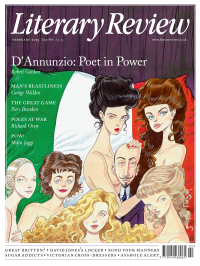John Sutherland
Nomenculture
Literary Names: Personal Names in English Literature
By Alastair Fowler
Oxford University Press 283pp £19.99)
Like most literary academics of my generation, I first came across Alastair Fowler through his superbly annotated 1968 edition of Paradise Lost. John Mullan – a critic Fowler cites, admiringly, and then, very typically, corrects – tells me it would be his desert island book. I’d agree. Fowler – now in his eighties – has more learning between his ears than most of us could acquire in eight lifetimes, though it would be wrong to say he wears his learning lightly. He doesn’t. This book starts off with an elucidation of the distinction between Cratylic and Hermogenean literary naming and the stern implication that if you don’t learn it, or already know it, what follows won’t make much sense.
Fowler’s subject is what are called ‘proper names’. The epithet has links with ‘property’. I own the words ‘John Sutherland’ much more securely than the word ‘reviewer’. One is intrinsically ‘me’, the other merely my current role. What is interesting, neurologically, is that our brains treat proper names in a

Sign Up to our newsletter
Receive free articles, highlights from the archive, news, details of prizes, and much more.@Lit_Review
Follow Literary Review on Twitter
Twitter Feed
Margaret Atwood has become a cultural weathervane, blamed for predicting dystopia and celebrated for resisting it. Yet her ‘memoir of sorts’ reveals a more complicated, playful figure.
@sophieolive introduces us to a young Peggy.
Sophie Oliver - Ms Fixit’s Characteristics
Sophie Oliver: Ms Fixit’s Characteristics - Book of Lives: A Memoir of Sorts by Margaret Atwood
literaryreview.co.uk
For a writer so ubiquitous, George Orwell remains curiously elusive. His voice is lost, his image scarce; all that survives is the prose, and the interpretations built upon it.
@Dorianlynskey wonders what is to be done.
Dorian Lynskey - Doublethink & Doubt
Dorian Lynskey: Doublethink & Doubt - Orwell: 2+2=5 by Raoul Peck (dir); George Orwell: Life and Legacy by Robert Colls
literaryreview.co.uk
The court of Henry VIII is easy to envision thanks to Hans Holbein the Younger’s portraits: the bearded king, Anne of Cleves in red and gold, Thomas Cromwell demure in black.
Peter Marshall paints a picture of the artist himself.
Peter Marshall - Varnish & Virtue
Peter Marshall: Varnish & Virtue - Holbein: Renaissance Master by Elizabeth Goldring
literaryreview.co.uk